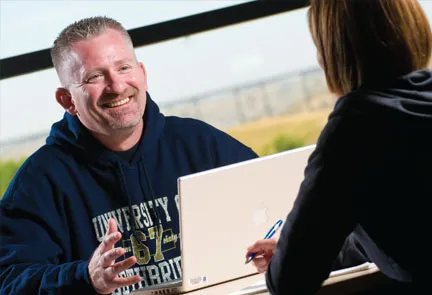Master of Counselling creates closeness despite distance

While your undergraduate career was all about drinking coffee and debating existentialism, a family and full-time job now make these luxuries impossible. As a busy professional, school has to fit around your life – not the other way around.
That’s why the University of Lethbridge Faculty of Education offers a distance Master of Counselling graduate program for those interested in becoming a professional counsellor or registered psychologist.
“The average student is someone who’s working, has a family, and wants to get a master’s degree in counselling,” explains assistant professor and registered psychologist Dr. Dawn McBride.
The blended distance and face-to-face program gives students flexibility in scheduling their time and allows them to learn from home.
Through summer institutes and practicum seminars, students meet one another and their instructors face-to-face, and develop a rapport that complements online communication. The program also harnesses technologies like web video-conferencing, online course platforms and discussion forums. Students are given training to use the technologies effectively. “We have people in place to help them learn the technology so it’s not an intimidating experience,” says McBride.
Alumna Donna Piercy earned her Master of Counselling degree recently, after two-and-a-half years of study. With certification in rehabilitation medicine and a degree in physical education, she’s now able to help people become healthier, inside and out.
But she admits she was initially apprehensive about a distance format. “I was shocked that I got to know my classmates and professors so well.”
Piercy, who describes herself as a “social person,” was delighted at the sense of community. She figures the communication was excellent largely because of an online format that required all students – even the shy – to participate. “In a classroom, there are a lot of people who sit and don’t talk. Online, everyone has to post equally.”
Not only does a sense of community help students support each other, but it enables a deeper understanding of the material, McBride explains.
“We really try to make sure that students are constantly applying material to their lives, to their clients’ lives, so there’s an integrative sense of wholeness to what they’re learning”.
***
"One of the advantages of being a smaller program, is close interaction between faculty, staff and students," explains program manager, Susan Pollock. "Within the program we have small class sizes and that allows for a lot of contact and mentoring," she says. "The faculty connections help open doors for students when they're enhancing their careers."
"Administrators also work with students "one-on-one" to ensure they're getting what they need. This reinforces an environment where students are supported in all stages of the program, she says. But creating a supportive distance program also helps the communities students live in. "Not only does the distance program allow them to stay working, but the community retains people who provide integral services. In this way it helps benefit the communities as well as the students," says Pollock.
